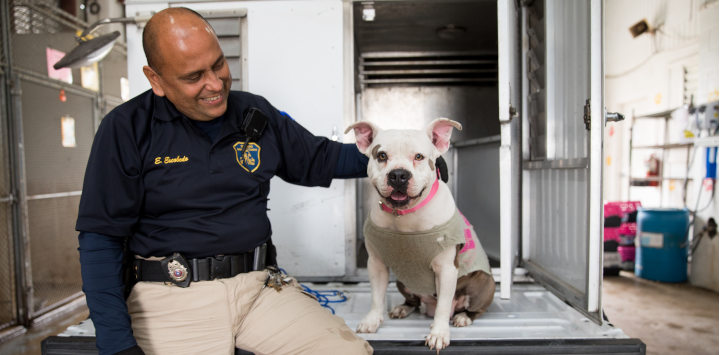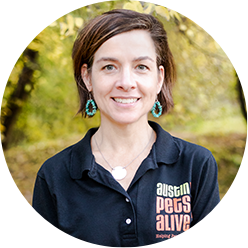
The Best Friends Podcast - Episode 13
Our work has evolved rapidly the past several years as we all work to change an institutionalized sheltering system that was not designed to save lives. The operational changes during COVID-19 have served to accelerate even more change and a determined group of leaders believes now is the time for us to create a new paradigm.
Historically our focus has been on helping pets but people have not been given the same priority. Times have changed and while we’re better at the people part, this new model of sheltering seeks to turn everything on its head and serve the community in new ways.
American Pets Alive! is leading the charge with a pilot project in 13 cities* where they hope to determine if an “Animal Social Services Model” is the wave of the future.
*since the publication of this episode, New York City has moved down to a tier two community
Click here to check out all the episodes from the podcast.
 RESOURCES FROM THIS EPISODE
RESOURCES FROM THIS EPISODE
The 10 Elements of the Animal Social Services Model
1. The shelter provides emergency medical care and short term housing for animals with urgent needs.
2. The public can reach the organization quickly and easily using remote technologies like text, phone, and web chats.
3. Volunteers are engaged in every area of the organization, including field and outreach services.
4. Telehealth services are available for animal caregivers considering surrender, and foster caregivers, and finders of animals who may be sick or injured.
5. Animals that physically enter the shelter have outcome pathways identified before or at the time of intake, so the in-shelter length of stay is reduced drastically.
6. The vast majority of pets are housed in foster homes, rather than shelter kennels, and most foster pets are adopted directly from foster homes.
7. Animal caregivers can access pet support services, including housing, medical and behavioral support, as well as food and supplies, to help keep the human-animal family together.
8. Animal services personnel operate as trained case managers, helping people keep their pets, providing resources and support to struggling pet owners, and assisting owners who need to re-home their animals.
9. The organization operates a comprehensive loose pet reunification service to successfully send most roaming pets home without them having to enter the shelter system.
10. Human social services agencies, rescue groups, and other community partners work closely with the animal services organization, recognizing people and their pets as a family unit.
Learn more at the American Pets Alive! website.

Ellen Jefferson, DVM
executive director, Austin Pets Alive! and American Pets Alive!
Dr. Jefferson graduated veterinary school in 1997 and started her career in private practice. In 1999, in response to an 85% death rate at the city shelter, she started EmanciPET, a low cost and free spay/neuter clinic in an effort to decrease the number of homeless animals. In 2008, still not satisfied with how fast the city of Austin was moving towards No Kill status, she stepped in as Executive Director of Austin Pets Alive! Since 2008, Austin Pets Alive! has been the driving force to bring the entire city of Austin to a greater than 90% save rate and the largest No Kill city in the US, and to redefine what No Kill means, as Austin's save rate now approaches 98%.
In 2012, Dr. Jefferson linked with San Antonio Pets Alive to implement the No Kill programs that were proven successful in Austin and helped drive the live release rate from 30% to 80% in 12 months. She is married to a horse veterinarian and they share guardianship of 2 dogs, 3 cats, and a bird. Dr. Jefferson was unanimously chosen as the first recipient of the Avanzino Leadership award, named for the father of No Kill and given for her outstanding contribution to the No Kill movement.

Dr. Josh Fisher
director of animal services, Charlotte Mecklenburg Animal Care and Control
Dr. Fisher has an educational background in population management/medicine, public health, veterinary sciences, informatics, and healthcare administration. He has been working in the veterinary medical/animal welfare field for over 15 years holding management roles in private practices, cooperate practices, the NCSU College of Veterinary Medicine, county government, and now as the Animal Services Director for the City of Charlotte/Charlotte-Mecklenburg Police Department.
A strong advocate for professional development and growth in the animal welfare industry, Josh seeks to involve staff in continued education and training opportunities as well as in cutting edge industry research. His professional interests focus on disease reduction/prevention, advanced marketing/placement and intake reduction tactics, strategic planning, and staff career development in the area of animal welfare. His projects include increasing interest of veterinary/veterinary technician students in the animal welfare industry as well as working with community veterinarians to break down barriers, develop relationships, and increase involved in community focused animal welfare (animal control and sheltering) practices.
It is a passion of Josh’s to bring a level of awareness to the animal welfare industry in such a way that young adults and college students make the decision to pursue animal welfare as a profession rather than falling into it by chance.




